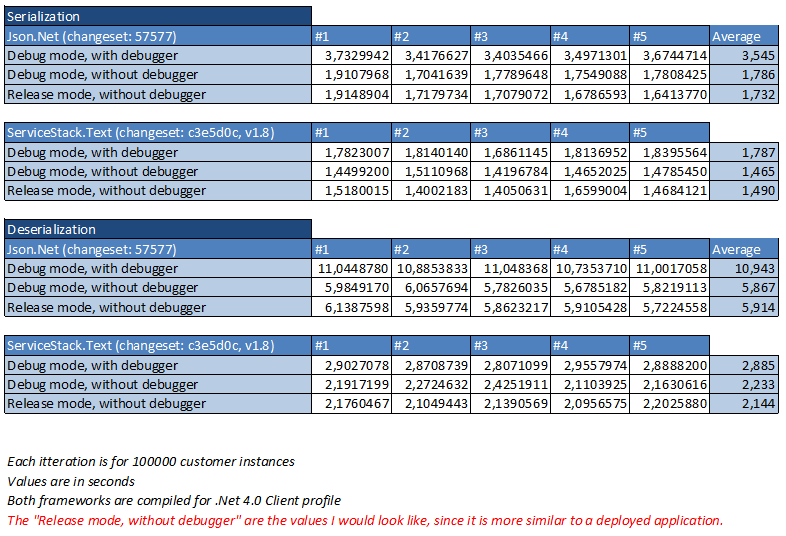This is going to be a verry short comparision of the two Json-serialization frameworks:
I have always used Json.Net when dealing with serialization of entities back and forth to Json, but then I stumbled upon this:
Fastest JSON Serializer for .NET released - http://www.servicestack.net/mythz_blog/?p=344
Man was I excited, since I need the "best" performance I can get for this in SisoDb.
Lets do a simple test
I just downloaded the latest version of both libraries (Json.Net - changeset: 57577), (ServiceStack.Text - changeset: c3e5d0c, v1.8), compiled them for .Net 4.0 Client profile and put together a very simple example. Note, I'm not testing features here, just raw serialization and deserialization. I don't know if you can "tweak" ServiceStack.Text as much as you can with Json.Net, e.g: Strategies for null property handling, missing member, indentation of Json etc.
The Item being serialized
[Serializable]
public class Customer
{
public int Id { get; set; }
public int CustomerNo { get; set; }
public string Firstname { get; set; }
public string Lastname { get; set; }
public ShoppingIndexes ShoppingIndex { get; set; }
public DateTime CustomerSince { get; set; }
public Address BillingAddress { get; set; }
public Address DeliveryAddress { get; set; }
public Customer()
{
ShoppingIndex = ShoppingIndexes.Level0;
BillingAddress = new Address();
DeliveryAddress = new Address();
}
}
[Serializable]
public class Address
{
public string Street { get; set; }
public string Zip { get; set; }
public string City { get; set; }
public string Country { get; set; }
public int AreaCode { get; set; }
}
[Serializable]
public enum ShoppingIndexes
{
Level0 = 0,
Level1 = 10,
Level2 = 20,
Level3 = 30
}
The Test application
static void Main(string[] args)
{
var numberOfCustomers = 100000;
var numberOfItterations = 5;
//Console.WriteLine("Json.Net");
//TimeSerializationAction(
// SerializeUsingJsonNet, numberOfCustomers, numberOfItterations);
//TimeDeserializationAction(
// Newtonsoft.Json.JsonConvert.SerializeObject, DeSerializeUsingJsonNet,
// numberOfCustomers, numberOfItterations);
//Console.WriteLine("ServiceStack.Text");
//TimeSerializationAction(
// SerializeUsingServiceStackText, numberOfCustomers, numberOfItterations);
//TimeDeserializationAction(
// ServiceStack.Text.JsonSerializer.SerializeToString, DeserializeUsingServiceStackText,
// numberOfCustomers, numberOfItterations);
Console.ReadKey();
}
private static void SerializeUsingJsonNet(IEnumerable<Customer> customers)
{
var json = customers.Select(Newtonsoft.Json.JsonConvert.SerializeObject).ToList();
}
private static void DeSerializeUsingJsonNet(IEnumerable<string> json)
{
var customers = json.Select(
Newtonsoft.Json.JsonConvert.DeserializeObject<Customer>).ToList();
}
private static void SerializeUsingServiceStackText(IEnumerable<Customer> customers)
{
var json = customers.Select(ServiceStack.Text.JsonSerializer.SerializeToString).ToList();
}
private static void DeserializeUsingServiceStackText(IEnumerable<string> json)
{
var customers = json.Select(
ServiceStack.Text.JsonSerializer.DeserializeFromString<Customer>).ToList();
}
private static void TimeSerializationAction(
Action<IList<Customer>> action,
int numOfCustomers,
int numOfItterations)
{
var stopWatch = new Stopwatch();
for (var c = 0; c < numOfItterations; c++)
{
var customers = CustomerFactory
.CreateCustomers(numOfCustomers);
stopWatch.Start();
action(customers);
stopWatch.Stop();
Console.WriteLine(
"TotalSeconds = {0}",
stopWatch.Elapsed.TotalSeconds);
stopWatch.Reset();
}
}
private static void TimeDeserializationAction(
Func<Customer, string> serializer,
Action<IList<string>> action,
int numOfCustomers,
int numOfItterations)
{
var stopWatch = new Stopwatch();
for (var c = 0; c < numOfItterations; c++)
{
var customerJsons = CustomerFactory
.CreateCustomers(numOfCustomers)
.Select(serializer)
.ToList();
stopWatch.Start();
action(customerJsons);
stopWatch.Stop();
Console.WriteLine(
"TotalSeconds = {0}",
stopWatch.Elapsed.TotalSeconds);
stopWatch.Reset();
}
}
Results
Each step: Serialization and Deserialization; has been executed one scenario at a time for each framework. Doing serialization in one execution and deserialization in another. Each time five iterations with 100000 customers in each iteration.
Scenarios: Serialization and Deserialization for:
- Running debug mode with debugger - (This value is not
representative since this isn't how an application will be
deployed) - Running debug mode without debugger - (This value
is not representative since this isn't how an application will be
deployed) - Running release mode without debugger - (These are
the measurements I would use for comparison, since this is how my
deployed application would run)
Measurements

Average values

Now you can decide for your self. I will continue with ServiceStack.Text, especially since deserialization is of greater importance for my project SisoDb.
Download the example code and Excel with the results.
//Daniel
